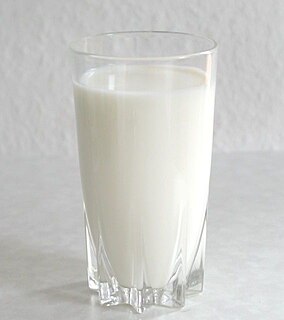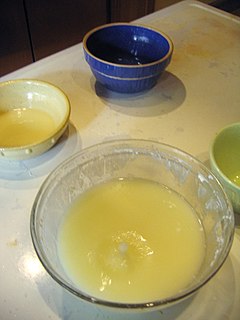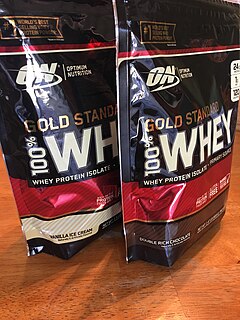
Dairy products or milk products are a type of food produced from or containing the milk of mammals. They are primarily produced from mammals such as cattle, water buffaloes, goats, sheep, camels and humans. Dairy products include food items such as yogurt, cheese and butter. A facility that produces dairy products is known as a dairy, or dairy factory. Dairy products are consumed worldwide, with the exception of most of East and Southeast Asia and parts of central Africa.

Whey is the liquid remaining after milk has been curdled and strained. It is a byproduct of the manufacture of cheese or casein and has several commercial uses. Sweet whey is a byproduct resulting from the manufacture of rennet types of hard cheese, like cheddar or Swiss cheese. Acid whey is a byproduct brought out during the making of acid types of dairy products, such as cottage cheese or strained yogurt.
Ultrafiltration (UF) is a variety of membrane filtration in which forces like pressure or concentration gradients lead to a separation through a semipermeable membrane. Suspended solids and solutes of high molecular weight are retained in the so-called retentate, while water and low molecular weight solutes pass through the membrane in the permeate (filtrate). This separation process is used in industry and research for purifying and concentrating macromolecular (103 - 106 Da) solutions, especially protein solutions.

Cheez Whiz is a processed cheese sauce or spread sold by Kraft Foods. It was developed by a team led by food scientist Edwin Traisman (1915–2007). While many sources give its national debut as 1953, it was advertised by Kraft and retailers in several states in late 1952.

Ricotta is an Italian whey cheese made from sheep, cow, goat, or Italian water buffalo milk whey left over from the production of other cheeses. Like other whey cheeses, it is made by coagulating the proteins that remain after the casein has been used to make cheese, notably albumin and globulin.

Cheesemaking is the craft of making cheese. The production of cheese, like many other food preservation processes, allows the nutritional and economic value of a food material, in this case milk, to be preserved in concentrated form. Cheesemaking allows the production of the cheese with diverse flavors and consistencies.

Kraft Singles is a processed cheese product manufactured and sold by Kraft Foods, introduced in 1949. Kraft individually wrapped "slices" are not really slices off a block, but formed separately in manufacturing. Kraft singles do however contain ingredients in common with cheddar cheese as evidenced in the ingredients list below, from the Kraft website. Those ingredients are: milk, whey, milk protein concentrate, milkfat, sodium citrate, contains less than 2% of calcium phosphate, whey protein concentrate, salt, lactic acid, sorbic acid as a preservative, cheese culture, annatto and paprika extract (color), enzymes, vitamin d3. Contains: milk.

Velveeta is a brand name for a processed cheese product that tastes like an American cheese, with a softer and smoother texture than non-processed cheese. When melted, Velveeta keeps a fully integrated and evenly clump-free liquid texture. It was invented in 1918 by Emil Frey of the Monroe Cheese Company in Monroe, New York. In 1923, The Velveeta Cheese Company was incorporated as a separate company, and sold to Kraft Foods in 1927.

Whey protein is a mixture of proteins isolated from whey, the liquid material created as a by-product of cheese production. The proteins consist of α-lactalbumin, β-lactoglobulin, serum albumin and immunoglobulins. Whey protein is commonly marketed as a dietary supplement, and various health claims have been attributed to it. An authoritative review published in 2010 concluded that the provided literature did not adequately support the proposed claims. For muscle growth, whey protein has been shown to be slightly better compared to other types of protein, such as casein or soy.
Simplesse is a multi-functional dairy ingredient made from whey protein concentrate used as a fat substitute in low-calorie foods. Originally brought to market in 1988, the manufacturer, CP Kelco, sells Simplesse to food processors as a "microparticulated whey protein concentrate" in dry powder form, and recommends that it be labelled as dairy protein on food labels. Older versions of the product also contain egg whites.
Bodybuilding supplements are dietary supplements commonly used by those involved in bodybuilding, weightlifting, mixed martial arts, and athletics for the purpose of facilitating an increase in lean body mass. The intent is to increase muscle, increase body weight, improve athletic performance, and for some sports, to simultaneously decrease percent body fat so as to create better muscle definition. Among the most widely used are high protein drinks, branched-chain amino acids (BCAA), glutamine, arginine, essential fatty acids, creatine, HMB, whey protein, ZMA and weight loss products. Supplements are sold either as single ingredient preparations or in the form of "stacks" – proprietary blends of various supplements marketed as offering synergistic advantages. While many bodybuilding supplements are also consumed by the general public the frequency of use will differ when used specifically by bodybuilders. One meta-analysis concluded that – for athletes participating in resistance exercise training and consuming protein supplements for an average of 13 weeks – total protein intake up to 1.6 g/kg of body weight per day would result in an increase in strength and fat-free mass, but that higher intakes would not further contribute.

Easy Cheese is the trademark for a processed cheese spread product distributed by Mondelēz International. It is also referred to as aerosol cheese, spray cheese or simply cheese in a can, and is similar to squeeze cheese. Easy Cheese is packaged in a metal can filled with air covered with a plastic cap that reveals a straight, flexible nozzle where the cheese is extruded.
Biological value (BV) is a measure of the proportion of absorbed protein from a food which becomes incorporated into the proteins of the organism's body. It captures how readily the digested protein can be used in protein synthesis in the cells of the organism. Proteins are the major source of nitrogen in food. BV assumes protein is the only source of nitrogen and measures the proportion of this nitrogen absorbed by the body which is then excreted. The remainder must have been incorporated into the proteins of the organisms body. A ratio of nitrogen incorporated into the body over nitrogen absorbed gives a measure of protein "usability" – the BV.
Soy molasses is brown viscous syrup with a typical bittersweet flavor. A by-product of aqueous alcohol soy protein concentrate production, soy molasses is a concentrated, desolventized, aqueous alcohol extract of defatted soybean flakes.

Strained yogurt, Greek yogurt, yogurt cheese, or sack yoghurt is yogurt that has been strained to remove most of its whey, resulting in a thicker consistency than unstrained yogurt, while preserving yogurt's distinctive sour taste. Like many types of yogurt, strained yogurt is often made from milk that has been enriched by boiling off some of its water content, or by adding extra butterfat and powdered milk. In Europe and North America, it is often made from low-fat or fat-free milk. In Iceland, a similar product named skyr is made.
Scalded milk is dairy milk that has been heated to 83 °C (181 °F). At this temperature, bacteria are killed, enzymes in the milk are destroyed, and many of the proteins are denatured. Since most milk sold today is pasteurized, which accomplishes the first two goals, milk is typically scalded to increase its temperature, or to change the consistency or other cooking interactions due to the denaturing of proteins.
Lactalbumin, also known as "whey protein", is the albumin contained in milk and obtained from whey. Lactalbumin is found in the milk of many mammals. There are alpha and beta lactalbumins; both are contained in milk.
Reverse osmosis (RO) is a water purification process that uses a partially permeable membrane to remove ions, unwanted molecules and larger particles from drinking water. In reverse osmosis, an applied pressure is used to overcome osmotic pressure, a colligative property that is driven by chemical potential differences of the solvent, a thermodynamic parameter. Reverse osmosis can remove many types of dissolved and suspended chemical species as well as biological ones (principally bacteria) from water, and is used in both industrial processes and the production of potable water. The result is that the solute is retained on the pressurized side of the membrane and the pure solvent is allowed to pass to the other side. To be "selective", this membrane should not allow large molecules or ions through the pores (holes), but should allow smaller components of the solution (such as solvent molecules, i.e., water, H2O) to pass freely.
Milk protein concentrate (MPC) is any type of concentrated milk product that contains 40–90% milk protein. The United States officially defines MPC as "any complete milk protein concentrate that is 40 percent or more protein by weight." In addition to ultrafiltered milk products, the MPC classification includes concentrates made through other processes, such as blending nonfat dry milk with highly concentrated proteins, such as casein.

A whey protein isolate is a dietary supplement and food ingredient created by separating components from whey. Whey is milk by-product of the cheese-making process. Whey can be processed to yield whey protein in three forms: whey isolate, whey concentrate, or whey hydrolysate. The difference between the whey protein forms is the composition of the product, particularly the protein content. Whey isolates contain the higher percentage of pure protein and can be pure enough to be virtually lactose free, carbohydrate free, fat free, and cholesterol free.










